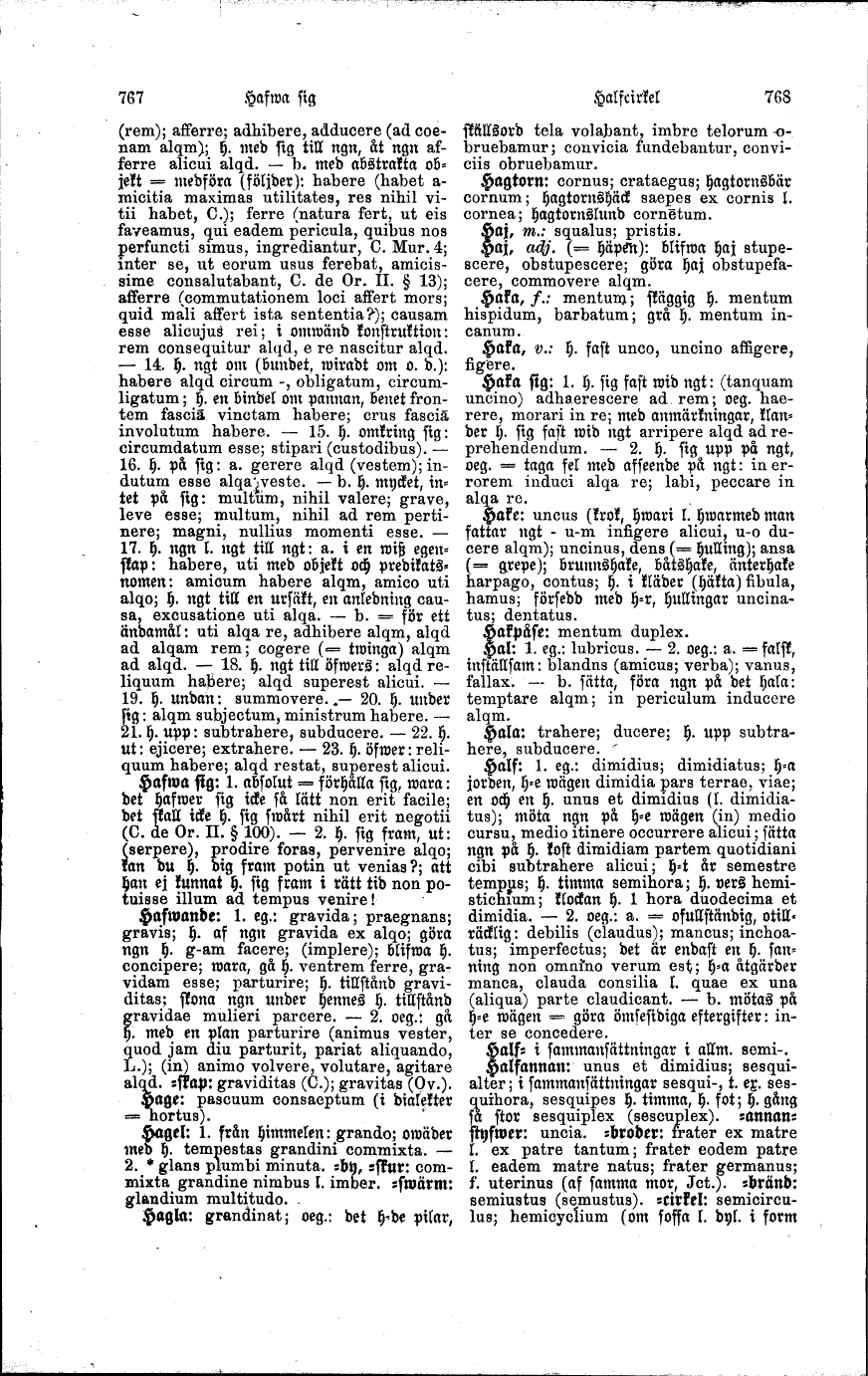
Full resolution (TIFF) - On this page / på denna sida - H - Hafwa sig ...

<< prev. page << föreg. sida << >> nästa sida >> next page >>
Below is the raw OCR text
from the above scanned image.
Do you see an error? Proofread the page now!
Här nedan syns maskintolkade texten från faksimilbilden ovan.
Ser du något fel? Korrekturläs sidan nu!
This page has been proofread at least once.
(diff)
(history)
Denna sida har korrekturlästs minst en gång.
(skillnad)
(historik)
(rem); afferre; adhibere, adducere (ad
coenam alqm); h. med sig till ngn, åt ngn
afferre alicui alqd. — b. med abstrakta
objekt = medföra (följder): habere (habet
amicitia maximas utilitates, res nihil
vitii habet, C.); ferre (natura fert, ut eis
faveamus, qui eadem pericula, quibus nos
perfuncti simus, ingrediantur, C. Mur. 4;
inter se, ut eorum usus ferebat,
amicissime consalutabant, C. de Or. II. § 13);
afferre (commutationem loci affert mors;
quid mali affert ista sententia?); causam
esse alicujus rei; i omwänd konstruktion:
rem consequitur alqd, e re nascitur alqd.
— 14. h. ngt om (bundet, wiradt om o. d.):
habere alqd circum -, obligatum,
circumligatum; h. en bindel om pannan, benet
frontem fasciā vinctam habere; crus fasciā
involutum habere. — 15. h. omkring sig:
circumdatum esse; stipari (custodibus). —
16. h. på sig: a. gerere alqd (vestem);
indutum esse alqa veste. — b. h. mycket,
intet på sig: multum, nihil valere; grave,
leve esse; multum, nihil ad rem
pertinere; magni, nullius momenti esse. —
17. h. ngn l. ngt till ngt: a. i en wiss
egenskap: habere, uti med objekt och
predikatsnomen: amicum habere alqm, amico uti
alqo; h. ngt till en ursäkt, en anledning
causa, excusatione uti alqa. — b. = för ett
ändamål: uti alqa re, adhibere alqm, alqd
ad alqam rem; cogere (= twinga) alqm
ad alqd. — 18. h. ngt till öfwers: alqd
reliquum habere; alqd superest alicui. —
19. h. undan: summovere. — 20. h. under
sig: alqm subjectum, ministrum habere. —
21. h. upp: subtrahere, subducere. — 22. h.
ut: ejicere; extrahere. — 23. h. öfwer:
reliquum habere; alqd restat, superest alicui.
Hafwa sig: 1. absolut = förhålla sig, wara:
det hafwer sig icke så lätt non erit facile;
det skall icke h. sig swårt nihil erit negotii
(C. de Or. II. § 100). — 2. h. sig fram, ut:
(serpere), prodire foras, pervenire alqo;
kan du h. dig fram potin ut venias?; att
han ej kunnat h. sig fram i rätt tid non
potuisse illum ad tempus venire!
Hafwande: 1. eg.: gravida; praegnans;
gravis; h. af ngn gravida ex alqo; göra
ngn h. g-am facere; (implere); blifwa h.
concipere; wara, gå h. ventrem ferre,
gravidam esse; parturire; h. tillstånd
graviditas; skona ngn under hennes h. tillstånd
gravidae mulieri parcere. — 2. oeg.: gå
h. med en plan parturire (animus vester,
quod jam diu parturit, pariat aliquando,
L.); (in) animo volvere, volutare, agitare
alqd. -skap: graviditas (C.); gravitas (Ov.).
Hage: pascuum consaeptum (i dialekter
= hortus).
Hagel: 1. från himmelen: grando; owäder
med h. tempestas grandini commixta. —
2. *glans plumbi minuta. -by, -skur:
commixta grandine nimbus l. imber. -swärm:
glandium multitudo.
Hagla: grandinat; oeg.: det h-de pilar,
skällsord tela volabant, imbre telorum
obruebamur; convicia fundebantur,
conviciis obruebamur.
Hagtorn: cornus; crataegus; hagtornsbär
cornum; hagtornshäck saepes ex cornis l.
cornea; hagtornslund cornētum.
Haj, m.: squalus; pristis.
Haj, adj. (= häpen): blifwa haj
stupescere, obstupescere; göra haj
obstupefacere, commovere alqm.
Haka, f.: mentum; skäggig h. mentum
hispidum, barbatum; grå h. mentum
incanum.
Haka, v.: h. fast unco, uncino affigere,
figere.
Haka sig: 1. h. sig fast wid ngt: (tanquam
uncino) adhaerescere ad rem; oeg.
haerere, morari in re; med anmärkningar,
klander h. sig fast wid ngt arripere alqd ad
reprehendendum. — 2. h. sig upp på ngt,
oeg. = taga fel med afseende på ngt: in
errorem induci alqa re; labi, peccare in
alqa re.
Hake: uncus (krok, hwari l. hwarmed man
fattar ngt - u-m infigere alicui, u-o
ducere alqm); uncinus, dens (= hulling); ansa
(= grepe); brunnshake, båtshake, änterhake
harpago, contus; h. i kläder (häkta) fibula,
hamus; försedd med h-r, hullingar
uncinatus; dentatus.
Hakpåse: mentum duplex.
Hal: 1. eg.: lubricus. — 2. oeg.: a. = falsk,
inställsam: blandus (amicus; verba); vanus,
fallax. — b. sätta, föra ngn på det hala:
temptare alqm; in periculum inducere
alqm.
Hala: trahere; ducere; h. upp
subtrahere, subducere.
Half: 1. eg.: dimidius; dimidiatus; h-a
jorden, h-e wägen dimidia pars terrae, viae;
en och en h. unus et dimidius (l.
dimidiatus); möta ngn på h-e wägen (in) medio
cursu, medio itinere occurrere alicui; sätta
ngn på h. kost dimidiam partem quotidiani
cibi subtrahere alicui; h-t år semestre
tempus; h. timma semihora; h. vers
hemistichium; klockan h. 1 hora duodecima et
dimidia. — 2. oeg.: a. = ofullständig,
otillräcklig: debilis (claudus); mancus;
inchoatus; imperfectus; det är endast en h.
sanning non omnino verum est; h-a åtgärder
manca, clauda consilia l. quae ex una
(aliqua) parte claudicant. — b. mötas på
h-e wägen = göra ömsesidiga eftergifter:
inter se concedere.
Half- i sammansättningar i allm. semi-.
Halfannan: unus et dimidius;
sesquialter; i sammansättningar sesqui-, t. ex.
sesquihora, sesquipes h. timma, h. fot; h. gång
så stor sesquiplex (sescuplex).
-annanstyfwer: uncia. -broder: frater ex matre
l. ex patre tantum; frater eodem patre
l. eadem matre natus; frater germanus;
f. uterinus (af samma mor, Jct.). -bränd:
semiustus (semustus). -cirkel:
semicirculus; hemicyclium (om soffa l. dyl. i form
<< prev. page << föreg. sida << >> nästa sida >> next page >>